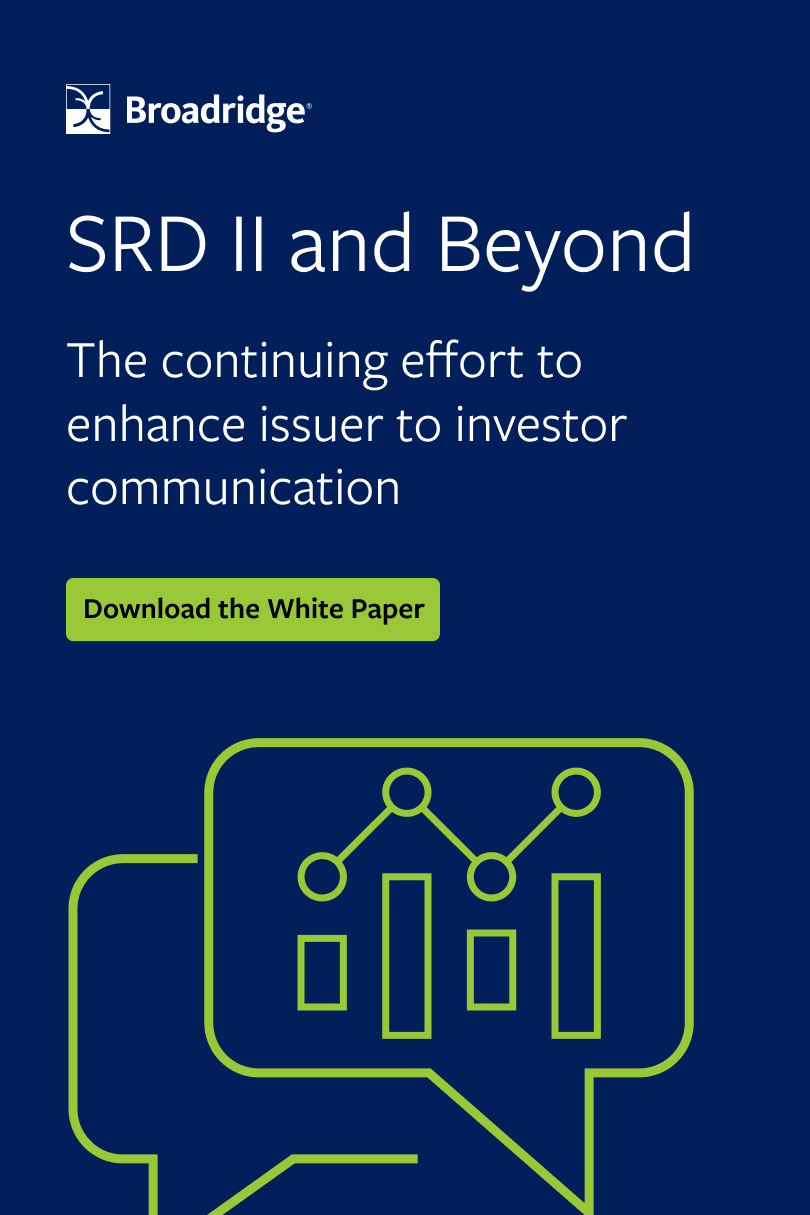As ESG data becomes more in-demand, from both regulators and investors, problems around data availability and quality are becoming even more prominent. Are firms deliberately holding back information, or simply unable to source it?
Earlier this year, ESG sustainability requirements were made a part of MiFID II, and the US Securities and Exchange Commission (SEC) suggested that funds’ ESG data should be more reliable and available. Yet disclosure of ESG data still proves an issue, with many firms seemingly reluctant to release information.
Along with regulation, there is market demand for ESG investment. EY’s 2021 global Alternative Fund Survey found that two in five investors are investing in a range of dedicated ESG products, an increase from 2020’s one in three. 79 per cent of investors surveyed named climate risk as their ESG priority when making an investment, and three quarters said that they are looking more closely at managers’ ESG policies than they were two or three years ago.
Adding even more evidence of ESG demand to the pile, Dow Jones research (‘Beyond Buzzwords’) has found that two thirds of financial leaders believe that ESG investing is the primary driver of sustained, long-term growth. It seems like a no-brainer — sharing ESG data will help companies to attract investors, keep regulators off their backs, and ultimately gain capital. So why do some seem to be dragging their heels?
Lip service?
Although companies are showing an interest in improving their ESG engagement, it is as of yet unclear whether this is simply lip service. According to the EY survey, 79 per cent said that they are planning to increase their ESG infrastructure engagement to some degree over the next year, and 71 per cent plan to introduce or increase their ESG offerings.
The industry’s fairly slow-moving engagement, particularly compared to public interest, may be due in part to a lack of certainty that ESG, as it currently exists, will be around for the long haul. CACEIS’ Pat Sharman, country managing director for the UK, believes that ESG and climate risk concerns are not a “fad” but will become a standard, with their values becoming integrated into companies’ responsibilities.
It is clear that whether or not firms believe in the longevity of ESG, regulations and client demand around it are not going away and companies have no choice but to change operations to meet their requirements.
Yet currently, even when data is released, its quality raises further problems. SS&C’s report, ‘Temperature’s Rising: The growing importance of ESG to EMEA M&A’, found that 19 per cent of respondents deemed available ESG due diligence data quality as ‘poor’ or ‘very poor’. A further 30 per cent found it to be merely ‘acceptable’.
With companies disclosing neither ample quality or quantity of data, it is no surprise that regulators are having to step in.
Standardisation shortage
The current scarcity of data is not helped by the fact that there are no standardised data disclosure requirements, leaving companies able to publish whatever information they see fit without consideration for how it can be compared to other market data. Although the industry is slowly seeing development in this area, from upcoming SFDR II implementation to an increase in sustainable accounting standards board disclosures and various other updates in the pipeline, the process is slow-moving, and far behind investor demand.
Joanna Appleton, head of content strategy at Dow Jones Newswires, believes that this is a key barrier for the industry: “in the absence of a common industry standard, organisations are able to pick and choose which metrics to disclose”.
The data becomes biased, and inconsistencies in reporting methods make it difficult, if not impossible, to make comparisons across the industry.
Similarly, Diane Eshleman, chief sustainability officer at Delta Capita, believes that a lack of consistency and an absence of agreed standards in self-reported data mean that it can be hard to trust. However, she also stresses the sensitivity of information being gathered — particularly on the ‘social’ side of things — and the difficulties that come with reporting and publicising this.
Keeping cagey
Of course, another reason that companies may be unwilling to share their ESG data is that it simply isn’t up to scratch. With a public who are continually becoming more engaged with ESG issues, firms may be concerned that their lack of engagement could be more damaging to their image than their lack of transparency. At AFME’s OPTIC conference, Larry Abele, chief investment officer at Impact Cubed, stated that firms were “hiding behind data issues” as a way to avoid taking action. While it is true that data availability and transparency are areas that need improvement, companies may be using this as a way out of disclosing their less-than-ideal statuses.
Back-office responsibilities
Although the front office is generally handed the task of improving ESG data quality, the middle and back offices also have roles to play, industry experts say.
The increase in regulations will mean that there is significantly more data in play, the responsibility of which will fall to “the already overloaded middle and back office,” says Arun Sarwal, CEO of Broadridge Fund Communication Solutions. He advises that firms look to turn to a service provider to help them manage the burden, leaving them able to more efficiently source data and go through governance processes.
Dow Jones’ Appleton expects standardisation of metrics and reporting to hit the industry in the near future. As a result, she predicts that “just as accounting practices are standardised for traditional metrics, so too will non-traditional metrics become more standardised. As this happens, responsibilities may shift away from corporate communications and corporate sustainability offices and to finance departments.”
Although the back office may think it is in the clear, ESG data issues will spare no one as time goes on, ESG commitments increase, and regulation tightens.
Young investors
Looking at the use of ESG data now and in the near future, the Dow Jones survey found that 28 per cent of sustainable investment enquiries come from Gen Z (12-26 year-olds). Yet, only 16 per cent of firms polled said they were targeting this demographic for ESG growth.
At this year’s Association of the Luxembourg Fund Industry (ALFI) Global Distribution Conference, a panel of young market participants stated that ESG concerns were high on the list of what millennials and Gen Z are looking for when it comes to investment opportunities. One speaker went as far to say that ESG was a priority above returns, while another stressed the need for clarity around the topic.
It is clear that the industry needs to change its approach to appeal to this younger demographic, given their increased awareness of ESG concerns — but can firms really change their spots? And do they genuinely think it is worth it to try?
A growing number of US Republican politicians want to penalise Wall Street investors who consider ESG when investing clients’ money, demonstrating the resistance from conservative audiences. While firms may wish to appeal to a younger market, they could risk losing more conservative established clients.
According to Sarwal, young people are “very ethically minded and interested not only in economic return but also in impact investing”, and are ready to dig for data to support companies’ ESG claims.
However, they may have difficulty in finding the information that they need — or making sense of it once they have. Dow Jones’ Appleton states that although young investors “want to support companies which share their values,” a significant barrier that they face is a “lack of education” — and much of the industry does not want to teach them.
Despite the rise of investment apps (which have been a major driver of youth investment, according to the ALFI panellists), potential investors are looking for clear data and expert advice, and coming up empty.
Stressing the importance of engagement with a younger demographic, Appleton says: “Financial professionals that focus their attention on the next generation of investors early into their investment journey have the opportunity to build strong, long-lasting connections with this group as they come of age and enter their prime earning and investment years. By understanding their motivations, addressing their fears and adapting to their unique investing habits, the financial community has an opportunity to better connect with this demographic, earn their trust and play a vital role in their education.”
As Delta Capita’s Eschleman says, “companies need to provide compelling and auditable information that demonstrates their commitment to sustainability.” She reiterates the fact that young investors are looking for genuine commitment, stating that companies must be “more credible when they articulate and commit to ambitious goals for continued improvement across all of the relevant metrics.”
Firms can no longer get away with throwing out scraps, and will have to fully commit to ESG approaches if they want to gain this growing market’s approval. As can be seen through the range of surveys around the topic, although they may be the most vocal group, it is not just young investors who are showing an interest in ESG.
On the right path?
While it may be easy to criticise the industry for its lack of ESG commitment, there are certainly signs that it is heading in the right direction. SS&C’s report also found that 41 per cent of respondents had turned down at least one M&A deal as a result of ESG concerns. This does suggest that there is change afoot — perhaps companies are, in fact, taking ESG into consideration, despite the undeniable data issues that surround it.
Dow Jones predicts that ESG investment will more than double over the next three years, yet right now it is difficult to see how this will come to fruition. As clients become more interested in sustainable investments, companies need to rethink how they produce, manage and report their ESG data.
ESG policies are only growing in importance, and with issues of greenwashing and false claims widely publicised, investors are savvy at sniffing out any twisted truths or outright lies. The current data situation will not cut it any longer, and firms must move quickly or risk losing out on investors and, ultimately, capital.



